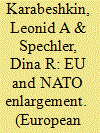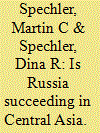|
|
|
Sort Order |
|
|
|
Items / Page
|
|
|
|
|
|
|
| Srl | Item |
| 1 |
ID:
080524


|
|
|
|
|
| Publication |
2007.
|
| Summary/Abstract |
For Russian policymakers no events in the post-Cold War period have had more momentous consequences or received greater public commentary, both before and after they occurred, than the almost simultaneous enlargement of NATO and the EU that took place in 2004. The most sensitive aspect of this 'dual enlargement' for the Russian Federation was the extension of these two organisations into the Baltic States, which had been part of the Soviet Union itself. Despite some uneasiness, Moscow anticipated that the extension of the EU into the former Soviet sphere, even into the former Soviet Union itself, would constitute a generally positive development, while NATO penetration of that sphere would be extremely harmful. Accordingly, Russia voiced little opposition to the EU's plans and made only limited efforts to insure that its major interests would be protected, while it actively sought to forestall the NATO project, especially with regard to the Baltics. As it turned out, however, most of Russia's expectations regarding the impact of these processes were mistaken, and Russia's interests were poorly served by its prior and subsequent responses
|
|
|
|
|
|
|
|
|
|
|
|
|
|
|
|
| 2 |
ID:
101781


|
|
|
|
|
| Publication |
2010.
|
| Summary/Abstract |
On a number of recent occasions, the top Russian leadership has expressed its special interest in the affairs of former Soviet republics, including the assertion that Russia has a "privileged" relationship with these now independent states.1 Is this a claim of accomplished fact, of future intention, or perhaps an empty expression of nostalgia for lost status? As we see it, the record of Russian actions in the largest group of these states-the five of Central Asia-allows us to exclude the first and question whether the second is realizable. Russia must contend with the aspirations of those states themselves, as well as the determined interests of China and, to a lesser extent, the West.
|
|
|
|
|
|
|
|
|
|
|
|
|
|
|
|
|
|
|
|
|